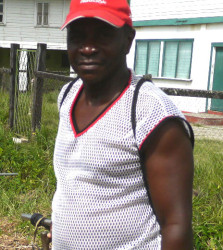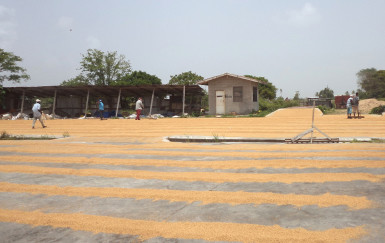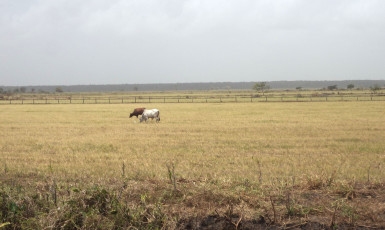Rice farmers in Leguan are facing a crisis as for the first time in recent memory they have been unable to sow because of the prolonged El Niño drought.

Farmers there are at a disadvantage because there is no conservancy on the Essequibo River island. They have no other means of accessing water, except by rain or the “sweet water” from the river.
They told Stabroek News during a visit last week that “People from the government would test the water (and) if it is not too salty they would open the Koker for us to get it.”
According to them, the previous government was planning to construct a conservancy but after conducting studies and consultations they could not go ahead.
The then government was also looking at the possibility of passing the conservancy through the farmers’ private land but that meant that some farmers would have had to give up their land entirely.
The other option, residents said, was on the government reserve but farmers would have been unable to access the water.
Even though the farmers planted the last crop the price was very low and most of them have still have not received payment.

General Secretary of the Rice Producers’ Association, Dharamkumar Seeraj, visited the island three months ago and took copies of their documents.
He promised to look into the matter for the farmers’ and returned a few days ago and told them he would “get a lawyer to fight…”
The farmers said they are “very stressed out over the situation and don’t know what to do. We are waiting on the government to intervene. We hope they can assist us with seed paddy and fertiliser like the previous government did.”
The previous administration also gave a rebate to farmers and also rescheduled their loans. They said too that the gold miners are getting a reduction for fuel and they want to enjoy the same.
Decline of rice industry

Vauldine Adams of Louisiana Village farms 10 acres of rice land belonging to her father, Felix Adams, 75, who is bedridden with a stroke.
She lamented that the field is very dry and because they were unable to cultivate this crop they have allowed the cattle to graze on it.
Unlike most of the rice farmers on the island, she did not grow up in rice farming but is still sad to see the industry declining. Her father was engaged in ground provision farming most of his life.
He suffered constant flooding in the 90s with salt water getting into his farm and damaging his crop. With 10 acres of land at hand, he then decided to venture into rice production. Since then this is the first time that they could not cultivate.

In addition, they suffered a “great loss” during the last crop when they did not even recover the money that was invested.
“The millers paid $1,600 for a bag of paddy weighing 180 pounds. They are exploiting the farmers; it used to be $3000 for a 165-pound bag,” she lamented.
Kumar Singh-Bhagwan, 24, of Osterbeck Village is farming seven acres together with his father, Diaram, 52, who “grew up in rice farming.”
He said their cost of production is usually very high because they have to hire a tractor to prepare the field and to transport the fertiliser and paddy.
As a young farmer, Kumar was hoping to continue with the rice business but it does not seem lucrative anymore. This is the first time that they have encountered such a severe problem with water.
He was hoping to continue with rice farming but said the industry does not seem promising anymore. The young man who is planning to get married soon is worried about what the future holds.
Apart from rice, they farm 12 acres of sweet potatoes close to a creek and they are able to access water through a self-made koker.
Mohamed Ramzan, 64, of Success Village, cultivates 65 acres of rice together with his sons; Sharab and Sohib. They are distressed that they were not able to cultivate rice this crop.
They were paid $1600 for a bag of paddy weighing 165 pounds for the last crop. “When we take out the expenses for harvesting and transportation we are only left with $1000 per bag.
We lost the money we used to cultivate the crop and it is not enough to invest in a new one,” he told this newspaper.
The previous crop, he said, the millers promised $3000 per bag but they were only given $2700.
Meanwhile, he felt the [previous] district council was discriminating against him because at a meeting, he had asked for his trench to be dug but they dug all the other trenches except his.
Junior Gordon, 50, of Phoenix Village, said he suffered “terrible blows” during the last crop and he is still unable to recover from it.
He was promised $1600 for a bag of paddy with the weight of 200 pounds from his 10-acre farm. The miller, RN Persaud, owes him $600,000 for the previous crop.
As such he is unable to pay his debt, which amounts to $400,000 for fertiliser, combine and tractor rental and other expenses.
He said the next crop should begin by May, by which time rain is expected, but he does not have any money to invest in it.
As if he did not suffer enough losses, Gordon hired a boat to transport some cows he had bought on credit from Essequibo but the people came and took the cows away.
He started rice farming 20 years ago but is also engaged in cash crop and ground provision farming. When Stabroek News caught up with him he was riding his bicycle around the village selling vegetables.
Another farmer, Roopchan Maraj, 56, of Success, a rice and cattle farmer, cultivates 100 acres with his two sons.
Out of that he rents 70 acres from a proprietor who has since sent him notice for payment, which he is unable to make, and to stop rearing cattle on the land.
“This is dry weather, there is nothing else to do on it and it is unfair for them to stop me to rear cattle there,” the distressed man said.
He pointed out that the rent was just $1200 per acre and it was increased to $6200, including $1200 per acre for rates and taxes. Some farmers, he said, pay just $5000 per acre.
He lamented that, “the paddy price drop and we are calling for the rental to drop as well.” The price for paddy is from $1000 to $1500 per bag and he said that is too low. I want the government to look into this matter.”
According to him, he bought machines, including tractors, combines and an excavator and has big installments to pay. Unfortunately, the machines are not bringing in an income.





